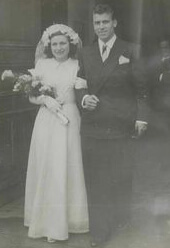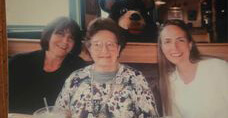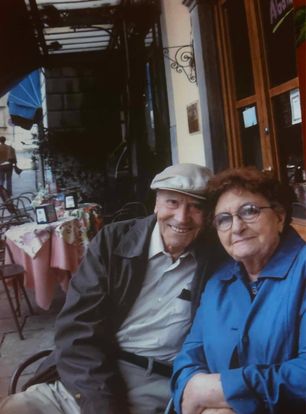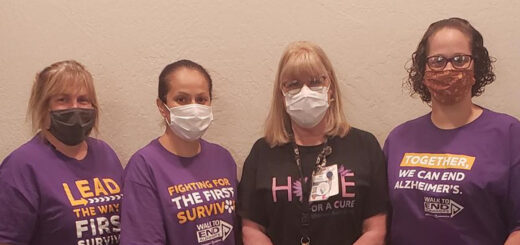Daughter travels 300 miles every weekend to visit mom with dementia
When Rina was diagnosed with Alzheimer’s disease, her daughter Chiara moved in to help. A few years later, Rina moved into a care setting in Monterey where her daughter would drive the 300 mile round trip from Stockton every weekend to visit her. Between the stress of a full-time job and caring for her mother on weekends, Chiara’s mental health began to suffer. Chiara shares how important it is to attend a caregiver support group.
From Paris to Italy
Having moved from a small village in Italy, Rina began living in Paris when she was only three months old. World War II began when Rina was a teenager and when she was 17 Germany invaded Paris. Throughout her childhood, and as much as they could during the war, Rina and her family would return to their small village in Italy to visit family and vacation. It was there that she met Gino, the man who would become her husband.
The couple fell in love and were married in 1948 in Orly, France. Unfortunately, after five years, they were forced to leave Paris and return to their home village in Italy. “It was a village with 600 people,” said Chiara, Rina’s eldest daughter. “There were rocks for roads. Living there wasn’t fun.”
Rina and Gino’s families had been living in this village since 1100. It was uncommon for any of the locals to move away, and no one had ever moved to the United States. Meanwhile, Rina’s younger sister met and married an American soldier and moved to the U.S. This inspired not only Rina’s parents and her middle sister to move to the U.S., but Rina and Gino as well.
However, timing was not on their side. Just as they decided to move, McCarthyism (a campaign in the U.S. accusing people of being communists despite not belonging to the Communist Party) in the U.S. surged. Because of this, the U.S. closed their borders to many immigrants. As an ex-Italian soldier who served under Mussolini on the Russian front, Gino was one of many who was denied access.
Moving to the United States
The couple remained in Italy for the next 12 years, eventually having their first child Chiara. “It took 12 years to get us cleared,” said Chiara “The FBI would show up in the little town. They would put [my parents] through hell. They kept telling my mom she could go to America whenever.”
Rina wouldn’t leave Italy without Gino. Together they waited until the day they’d be able to move as a family. Meanwhile, back in the U.S. Rina’s sister was talking to the city council members and trying to get them to talk to congress. Eventually her hard work paid off because in 1959 the ban was lifted making Rina, Gino and Chiara some of the first Italians to arrive in Rhode Island.
Within a year of arriving in the U.S., Rina and Gino had their second daughter, Francesca, and eventually moved west to Stockton, California. There they remained a tightknit family even as their children grew up and started their own families. “I always wanted to know what they had to say,” said Chiara. “Even when I was married, I went to mom and dad for personal things. My daughter would even say, ‘I’m going to talk to Grandma, not you.’”
Quick to anger
As Alzheimer’s and other dementias progress, behaviors can dramatically change. This can include becoming more aggressive and/or angry. Rina, who had always been a kind, softspoken woman, suddenly became quick to anger, not only with Chiara but also Gino. “I noticed she would get angry with me. Real anger,” said Chiara. “Mom has never ever spoken to me that way. She threw something at me one time, she hit my dad. Dad said, ‘Something is wrong with your mom.’”
Chiara took Rina in to see a doctor where she was diagnosed with Alzheimer’s disease.
Moving in with her parents
After the diagnosis, Chiara decided to move in with her parents to help her dad care for her mom. Several nights Rina would wake Chiara at three in the morning to let her know breakfast was ready. Over time this began to wear on Chiara and she wasn’t sure how much longer she could keep doing this.
“During the daytime, we hired a lady who would be there from seven in the morning to three in the afternoon,” said Chiara. “Then I would stay there from three until seven a.m. The [professional care worker] was a very special lady. We were definitely blessed to find someone as caring as her.”
Chiara and the care worker continued taking turns for nearly six weeks before Chiara’s parents went to stay with Francesca in Pacific Grove, California (near Monterey). While they were there, both Rina and Gino ended up in the hospital. Gino broke his femur and Rina had kidney stones which would require surgery.
New research from Harvard Medical School suggests that delirium, a common complication after surgery in older adults, results in an increase in cognitive decline. Because of this, Rina’s doctor warned that Rina’s Alzheimer’s may get worse and suggested the family may need to move her into a care setting. “Mom had two other siblings, and they had Alzheimer’s,” said Rina. “All of my cousins said, ‘No, we’re not taking them to a care setting.’ But all of us did. We’re all working, it’s not the same.”
Visiting her parents
The care setting the daughters chose was close to Francesca’s house and it was decided that both parents would move there. As a married couple they were initially placed in the same room together. However, Gino spent the whole time worrying about what Rina was doing and couldn’t rest. At the same time, Rina couldn’t understand why Gino wasn’t leaving for work every day and would get frustrated.
The pair was spilt up and Francesca continued to visit regularly, making sure that their mother was receiving the best care. On the weekends, Chiara would make the two-and-a-half-hour drive down from Stockton and spend time with her parents. “I was leaving every Friday and came home every Sunday,” said Chiara. “I did this every weekend for four years. My sister had kids, and I did my part on weekends.”
Gino continued to live there, checking in on Rina until his death in 2011.
Taking a break
Caring for her mother took a toll on Chiara. By 2015 it was affecting both her performance at work and her mental health. “It drained me,” said Chiara. “That last year I was evaluated [at work]. It was one of the worst evaluations I’d ever had. I couldn’t focus on my class.”
Luckily, Chiara had a very understanding boss and several weeks of leave saved up. Her boss suggested she take the leave and focus on her mother. Chiara took six weeks off and spent it at her sister’s house.
Battling depression
According to the Alzheimer’s Association 2023 Alzheimer’s Disease Facts and Figures report dementia caregivers are significantly more likely to experience depression and anxiety than non-caregivers. Thirty-two percent of dementia caregivers in the United States experience depression.
Like many dementia caregivers, Chiara was also experiencing depression. “I didn’t want to talk to my sister or my friends,” said Chiara. “I wasn’t interested in anything. I needed to change my lifestyle.”
Finding support
Both their mother’s doctor and her nurse practitioner suggested that Chiara and Francesca attend a support group. Their mother’s care setting recommended an Alzheimer’s Association support group. Through the support group she found a community of people that understood exactly what she was going through.
“It was nice to go there and think ‘Gosh we’re not the only ones going through this,’” said Chiara. “It made me feel like someone else knows how I feel. That they [are going through] the same thing as I am. It’s where we can all hold hands and cry if you want. Or laugh at something our family member would say. It’s okay to laugh and tell jokes about something your parents did. That lightened it up because you can’t always discuss gloom and doom.”
Showing up
In 2016 Chiara retired from teaching, and in 2017, after nearly a decade living with the disease, Rina died at the age of 94. Coincidentally, Rina’s two siblings, who also had the disease, died at 94.
“When my mom died everyone at the care setting came out as they [took her out],” said Chiara. “We were the only family that was there every day. Three of the caregivers came to her funeral. Those nurses and staff notice who shows up and who doesn’t. [It’s important to] just show up, even if it’s only for 10 minutes.”
Advice for other caregivers
Chiara encourages other caregivers to stop using the word remember. “It’s the worst thing you can do to a person living with Alzheimer’s,” said Chiara. “[When Mom would ask about Dad] instead of saying ‘Dad died,’ we’d say, ‘Oh, Dad went to work.’ She won’t remember in 20 minutes.”
Another thing Chiara found helpful was to play her mother’s favorite music. Studies have shown music may reduce agitation and improve behavioral issues that are common in the middle-stages of the disease. Even in the late-stages of Alzheimer’s, a person may be able to tap a beat or sing lyrics to a song from childhood. Music provides a way to connect, even after verbal communication has become difficult.
Lastly, Chiara encourages caregivers to hold on to the good times. “Mom loved old westerns,” said Chiara. “As we watched them, she’d laugh and remember we’d watch them every week. Bonanza [(a TV show)] was one of her favorites. Those are the light days and that’s what I want to remember.”
If you’re interested in finding a support group, please visit alz.org/crf or call our 24/7 Helpline at 800.272.2900 to find the one that will best fit your needs.





















